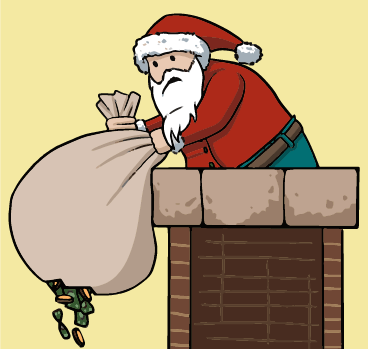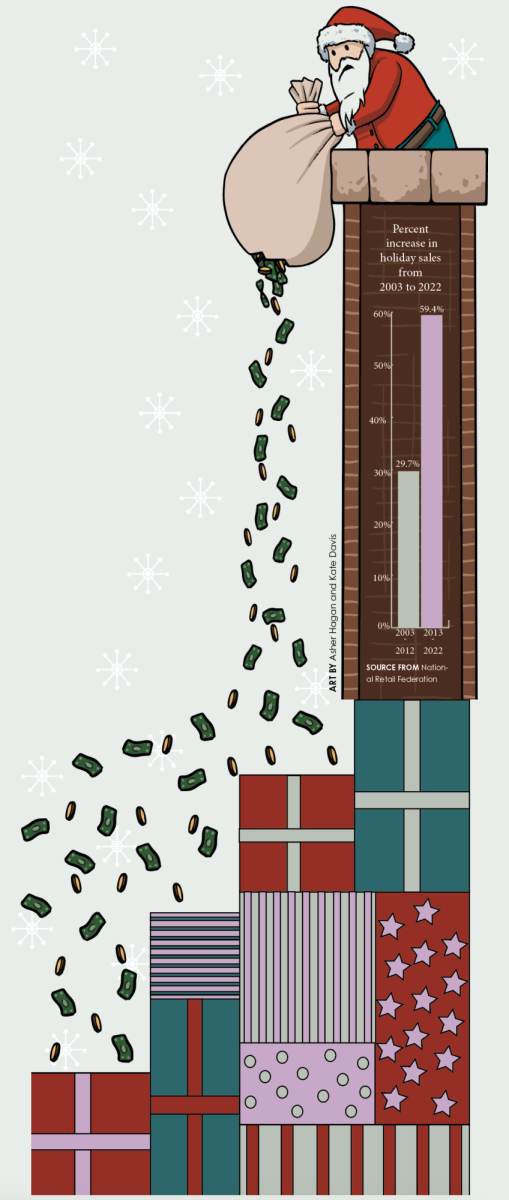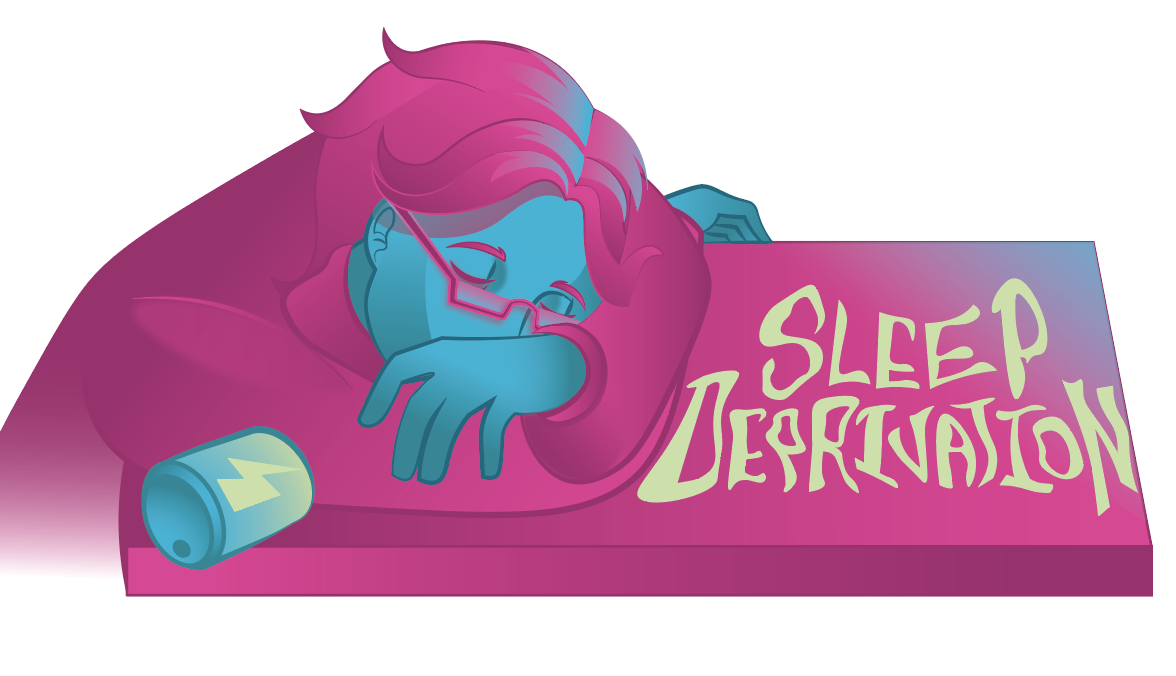
Boxes upon boxes, bags upon bags. The weight in Santa’s sack makes him want to gag.
He steps off the sleigh with help from an elf, he lumbers down the chimney eying the stockings on the shelf.
‘Materialism is a problem,” Santa thinks as he walks, he is disgraced with the waste in each and every box.
The Holiday Season
Stores line their shelves with items decked out in drawings of Santa, elves, and reindeer, and the latest rendition of ‘Jingle Bell Rock’ plays over the store intercom. Senior Tatum Wilson watches as little kids rush past the nativity scenes and the religious aspects of Christmas, in favor of the commercialized holiday artifacts.
“As a Christian, I do really enjoy Christmas and I think it’s nice to have everything like the decorations, but it also takes away from the meaning behind the holiday and its importance,” Wilson said. “I feel like people should not be mass producing and profiting off of a religious holiday. The focus of the religious holiday is now focused on things that are not related to Christianity at all, such as Santa or elves. I don’t necessarily have a problem with those things existing and being a part of people’s traditions, but I just feel like it takes away from the meaning and the religious value of Christmas.”
Materialism, or an obsession with material items and possessions, often comes into play during the holiday season, as people feel the suffocating stress of finding the perfect gifts for friends and family.
“I think there’s a lot of pressure during the holidays on purchasing a bunch of gifts rather than focusing on the quality of gifts,” senior Maggie Oliver said. “It’s also stressful feeling like I have to buy certain things to fit the trends, meaning I’m making so many unnecessary purchases.”
According to the National Retail Federation (NRF), between 2016 and 2022, there was a 43.7% increase in spending during the holiday season, or the months of November and December. The NRF is predicting that the increase between 2022 and 2023 will be between 3% and 4%. With this statistic in mind, some students are making a conscious effort to escape the consumerism cycle.
“Gift-giving is important to me, but I’ve always been the person that takes people for experiences rather than giving items,” Oliver said. “I just think that memories and spending time with people is worth so much more than just giving them items.”
Similarly to Oliver’s passion for giving others new experiences, AP economics teacher Ruth Narvaiz has explored other avenues to participate in holiday traditions without falling into the materialism trap.
“I make a lot of gifts and I do lots of arts and crafts,” Narvaiz said. “I love to give homemade gifts. And I like to get homemade gifts too because of that. It takes a lot more work and thought to do that. I’ve noticed some people really appreciate it. I’ll make gifts and some are like ‘wow this homemade’ and get excited about it.”
Contributing Factors
The holiday season is not the only thing being affected by materialism. The ability to easily purchase things online has increased the unneeded expenses of many consumers.
“I could sit here during my lunch hour and spend hundreds of dollars without ever going anywhere,” Narvaiz said. “And a few years ago I would have never ordered things online or ordered things over mail. But now I wonder if I can find some random thing and somebody out there on Google sells that random thing that you think you need, it’s crazy.”
With the expansion of technology and increased access to the internet has come a new world of temptations for consumers. According to Statista, 43% of consumers in the United States prefer shopping online as compared to visiting stores in-person.
“Social media influences me to buy more because I wouldn’t discover the majority of the items I purchase without seeing them on TikTok, Instagram, or other apps,” sophomore Ivy Newman said. “If you only physically go to stores a certain amount, you’re not exposed or influenced to buy things very often. Whereas when you see it online constantly you can just buy it from your home. The simplicity of it makes it so much more tempting.”
This increased usage of social media has accelerated trend-culture among adolescents, leading users to fall into the cycle of never-ending consumption.
“With the way trends work, seeing so many people around me wearing one thing or buying one thing makes me want to buy it,” Newman said. “It makes me feel like I need to purchase it because everyone else has it. I mean something will be trending one day and you buy it, but then the trends change so quickly, and you buy the next thing. It’s just a continuous cycle of purchasing something, no longer caring about it, and then purchasing the next item.”
In 1899 economist Thorsetein Veblen coined the term conspicuous consumption, stating that people may purchase certain items, not for their practical use, but as a symbol of their wealth to prove their social value to others.
“I don’t necessarily think I purchase things simply to say I have them,” Oliver said. “However, I watch people buy multiple colors of Stanley cups and things like that because they see it online and feel like they need those things in order to be trendy.”
The Consequences
According to the US Bureau of Labor Statistics, the average annual expenditures in the US increased by 9% from 2021 to 2022. This increase in purchases being made has begun to have detrimental effects.
“Consumer-culture produces a lot of waste, and a lot of pollution,” Oliver said. “It’s also ethically bad, because a lot of fast consumption means that unethical ways of producing things are used, and you’ll find a lot of that in third world countries that are mass producing items we don’t really need.”
According to the National Library of Medicine, the never-ending quest for material items and constant consumerism has resulted in resource depletion, and the acceleration of climate change due to an increase in demand for unsustainable goods.
“The more we buy the more impact we’re having on the environment,” Wilson said. “The more we buy, the more companies want to produce, because they want to make the most profit possible. For example, with fast fashion we constantly keep buying clothes instead of thrifting items or reusing items. Then there’s the overproduction of other items that could easily be reused or that could be bought more ethically. People don’t really realize the impact and it ruins the environment, with things such as factories, which contribute to greenhouse gases.”
In addition to the environmental consequences, the increased commercialization and purchasing of material items has impacted the scarcity of numerous cultural artifacts.
“I feel like a lot of companies steal other people’s cultures and they mass produce it,” Wilson said. “It gives people this idea that culture can be sold and can be profited off of. Then, people participate in these trends and purchase certain items not knowing that it’s cultural appropriation, and it just leads to a lot of larger issues and mistreatment of cultures.”
Despite the negative consequences of materialism, the US economy has been built upon consumerism and its benefits.
“The reason they call Black Friday, Black Friday is because for lots of businesses that’s the time when they start making money,” Narvaiz said. “If you’re in the red, you’re losing money. If you’re in the black, you’re making money. And that traditionally was the day that businesses broke even and then started making money. Lots and lots and lots of businesses really depend on the holiday season just to break even.”
Moving Forward
In order to best predict the future of consumerism, Narvaiz has been examining past events and how they may be impacting our current issues and their potential longevity.
“I don’t see the cycle of consumerism changing at all in the near future,” Narvaiz said. “I think it’s going to remain what it is now unless we have a serious economic bust. I think what we’re seeing now is more consumerism as people had saved money during the COVID-19 pandemic. And now they’re looking for ways to spend that. So I don’t I don’t see a change happening soon.”
Conversely, others have a more optimistic outlook on the future of materialism, anticipating a change in the way society approaches consumerism.
“I’ve seen a big shift on social media of people beginning to use things they already have, or shortening their makeup routine, or other things like that,” Oliver said. “I think people will fall back in love with simplicity. I think minimalism will become a trend again.”
As the holiday season comes to a close and we look into the new year, people are considering how we can combat the root of materialism in order to achieve a more modest future.
“There’s this Buddhist saying that basically says that the cause of suffering is want, or that if you don’t want things you’ll be happier,” Narvaiz said. “So you should stop wanting. I don’t know if the media can change people’s wanting things. I think it’s just human nature.”
Wilson has focused on improving her own spending habits and advises others to be conscientious of their own consumerism tendencies.
“Just be aware of what you’re buying and be aware of how companies produce their items and whether or not they are ethical,” Wilson said. “Think before you buy stuff. I feel like lots of times people purchase things and then it sits in their house or their closet and they never use it. So just ask yourself before buying something: do you need it? Is it ethically sourced? Just be very aware of your own consumption of items.”






